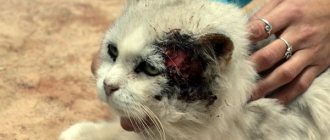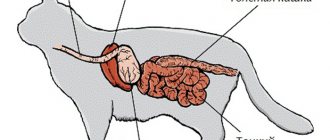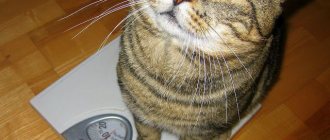Urination and defecation in kittens by age
A spontaneous reflex to urination and stool in babies occurs at three weeks of age.
During the first time after birth, small kittens are not able to cope with the need on their own.
The process of releasing urine and feces occurs with the help of certain efforts of the mother, who, by massaging the tummy area, activates the defecation reflex, and then licks the kitten.
The process of digesting food in kittens involves defecating up to 10 times daily. When the cubs are with the mother, she takes care of it.
In the absence of a cat, small pets should be stimulated to defecate once every 2-3 hours, preferably before and after meals. In order to remove feces and wipe the kitten, use cotton wool discs soaked in warm clean water or pieces of a soft cloth.
The spontaneous reflex to urination and stool in babies occurs at three weeks of age.
Place the tray in the bathroom
Install a cat litter box in a low-traffic area of your apartment. When a kitten feels the urge to urinate, he involuntarily looks for a place to hide (this is why you so often find puddles in the corners or under the sofa.) Ideally, such a secluded place is the bathroom. However, access to the tray must not be blocked. This means you will have to keep the door open or construct a through hole. A quiet utility room or laundry room is also a good choice. To get the kitten used to the litter box, you can leave him alone in the designated area for a while. This way he will get used to it much faster. When choosing a tray, consider the height of the walls. If it is difficult to climb there, your little pet will choose a more comfortable place for his business.
A simple underground cooler for drinks from water pipes: instructions
Juicy sandwich cake for tea: carrot sponge cake and a layer of airy cream
Who could landowners in Rus' hire as servants and how much did they pay these people?
How often should a one-month-old kitten go to the toilet?
During the first 20-30 days after birth, kittens strengthen their intestines and multiply beneficial bacteria in them, which helps to activate bowel movements.
It is considered normal for kittens to go to the litter box approximately 3-6 times a day at one month of age. At the same time, the feces do not have a very thick consistency, with the absence of elements of blood, mucus and pieces of poorly processed food.
Be sure to read:
How many times a day should a cat pee: the norm for an adult animal and kittens, when deviations are safe
The pet owner should monitor the amount and density of feces excreted. A deviation from the norm is the presence of liquid stool and constipation.
Also, the quality of functioning of the animal’s digestive system is determined by palpating the abdominal area. In healthy babies, the abdomen is soft, touching it does not cause pain.
For the kitten to go to the litter box
In order for the mustachioed tabby to regularly relieve himself in the litter box, you need to choose a suitable location, focusing, in addition to your own conclusions, on cat customs.
This factor is especially important for kittens who have recently found themselves in a new home. To make it easier for a newly arrived pet to get used to the toilet, felinologists recommend:
- Monitor him carefully after every nap and feeding.
- Install 3-4 trays in different places in the house, including the bathroom and toilet room, balcony and corridor, so that it is easier for the baby to have time to reach the “potty”.
- Placing the tray in the bedroom or kitchen will be inappropriate both from the point of view of the interior and from the cat's understanding.
- Use a filler that is close to natural, for example: wood pellets or clumping “sand” without special flavors.
- For some picky eaters, a tray with pieces of thin paper (toilet or newspaper) placed on the bottom will be suitable. Sometimes kittens stubbornly settle next to the tray, then it is recommended to place the tray on a spread newspaper, gradually reducing its area.
- It is important that the smell of physiological secretions leaves a mark on the intended latrine, which will force the cat to come here next time. Thus, at the first stages of toilet training, it is not recommended to wash the tray too thoroughly - rinsing with running water will be enough.
- For educational purposes, you can use special sprays for toilet training a cat, sold in pet stores.
Reasons for refusal. A pet may ignore the offered “potty” and relieve itself in a more suitable place if:
- the tray size is too small or, on the contrary, deep;
- the tray was just brought from the store and has an unusual smell;
- an unfamiliar filler is poured into the tray;
- the tray is located next to the feeding or resting area;
- the tray is located in a part of the house that the cat rarely visits;
- the cat litter is not cleaned in a timely manner;
- The tray is washed using strong-smelling household chemicals.
Some cats prefer a toilet or bathtub as a latrine. Perhaps they associate this with the presence of constantly flowing water that washes away odors, or, as some adherents of “cat science” claim, they simply copy their owners.
When a new pet comes into the house, the family begins to get to know him. To understand your little friend well, you need to monitor him, and soon, based on specific signs, you will be able to understand whether the kitten wants to go to the toilet, or wants to eat, or simply needs attention. If the baby is raised by a cat, then he will behave the same as his mother. For example, grooming yourself or going to the toilet in a litter tray.
How to determine that a kitten wants to go to the toilet
The process of accustoming a small furry pet to using a litter tray is gradual, requiring a sufficient amount of time and endurance on the part of the animal's owners. To determine when your baby wants to go to the toilet, you need to monitor his behavior.
The most common signs:
- scratching the floor, flooring (“digging” a hole for future work);
- sniffing objects around you;
- marking time, restlessness;
- meow.
Having noticed actions signaling a possible bowel movement, it is recommended to immediately place the kitten on a tray with a special filler.
If the kitten is marking territory
The same cannot be said about random puddles throughout the apartment. These areas must be disinfected without fail. Otherwise, the kitten will find its marks and settle into this place again. If your pet does not want to get used to the litter box, be patient and continue to monitor the cleanliness of the cat litter box. Be sure to take your baby there immediately after waking up. If a puddle is again noticed near the bed, do so without shouting or being rude. Otherwise, the kitten will perceive the tray as a place of punishment.
When does a kitten begin to feed on its own?
Upon reaching the age of one month, the digestive organs of a cat cub are fully formed and filled with beneficial bacteria.
The basis of nutrition is mother's milk, but it must be gradually supplemented with other products that facilitate the baby's transition to independent feeding.
The main food elements included in the list of possible complementary foods:
- thin porridge;
- pate from boiled meat, fish;
- lactic acid products.
Pet owners need to familiarize themselves with the main rules for introducing complementary foods for kittens:
- The transition should begin by giving warm milk. If the kitten does not understand how to lap, it is recommended to gently poke the pet’s muzzle into the drink. By licking himself, he will understand how to act.
- Then you can offer your pet thin porridge or meat pate.
There are also industrial feeds for feeding kittens. They can be started from 1 month.
At first, you will have to wipe the kitten after each meal. Gradually, he will learn to do everything carefully and independently clean his face of food debris.
Be sure to read:
Antigadin for cats: purchased and homemade products
Why does a cat meow?
Every owner who has or had a cat has at some point wondered, why do cats meow? This, in my opinion, is an important and quite interesting question, because knowing what your pet wants from you is simply necessary. Knowing the reason for meowing will help you please your cat without any problems. So, let's figure out why your cat meows?
We recommend reading: Medicine for Bladder Stones in Cats
A cat may meow for the following reasons:
The most likely reason for meowing is a request for food. Most often, a cat meows if you give it food outside of its daily routine. Accordingly, as soon as she wants to eat, she immediately begins to meow.
Attracting attention can also cause a cat to meow. Why meow? You ask. But because, unfortunately, the cat doesn’t know how to talk to people yet.
If you pay little attention to your pet, then meowing may occur due to a lack of love and affection. To correct this, try to pick up your pet and pet it more often. When he climbs onto your lap or onto your keyboard, don't ignore it, just give him 5 minutes and he'll be happy.
If you have not trained your pet to patch, then the meowing may be hidden as a request to go to the toilet. To avoid this, you must accustom him to a patch from a very early age, or better yet, as soon as you buy a kitten.
Cats, like all other creatures on Earth, are capable of experiencing pain. And this can also be the reason for meowing. To find out if this is true, go up to your cat and feel it from all sides. Due to the cat's constant jumping, the paws most often hurt. If your cat meows when you press on its paw, contact your veterinarian immediately.
Very often cats meow during sexual activity. You wouldn't wish such meowing on your enemy. You will immediately distinguish him from everyone else
Source
Why do cats meow? There are many, many reasons. In this article we will try to look at the different types of cat meows and what they mean.
It doesn't take a scientist to translate into human language what it means when a cat meows loudly and demandingly. This “MEOW” can be translated as: “I want my lunch / to be petted / to play with me / to clean my toilet / to be let out for a walk, etc.” Her posture and body language, and where she stands - will not allow you to make a mistake with the interpretation.
Here, too, it is usually difficult to make a mistake with the interpretation. Very often a cat says this: “Well, I’m so cute, give me a little attention.” Or she gently asks for what she wants, but she knows she shouldn’t get and won’t get it - for example, your dinner. And the cat knows very well that very often this trick will work, and you will follow her lead and do everything she asks.
When a cat howls, it indicates pain, injury, or that the cat is very upset. You should always react and check when you hear your cat howling loudly.
Some smart cats understand that their howls are always responded to, and take advantage of this. If you fall into this category, then check why the cat is screaming, and if he is simply demanding attention, ignore these screams. Otherwise, you will further accustom the cat to this behavior.
The cat's battle cry is unmistakably identified. Why does a cat scream before and during a fight? If a cat screams very loudly, he is trying to scare his opponent. If after this a fight still begins, the screaming continues to add aggressiveness to the behavior.
The hiss of a cat. This may be a sign of a fight, or it may be telling a person, dog, or other cat not to come closer or enter its territory. It's best to back away if your cat hisses at you. It’s better to wait until the cat calms down and come back later, unless you decide to set new standards.
Source
Why does the kitten constantly meow?
A small kitten is primarily a growing organism that may encounter some problems. If the baby shows concern, you, as the owner, should immediately pay attention to this. Often breeders are faced with the question, why does a kitten constantly meow? In this article you will find the answer to it.
There may be several reasons for this behavior; as soon as you figure out which one applies to your pet, you will be able to quickly find a solution.
Moving to a new home is stressful for a kitten. If you have just taken him away from his mother and other kittens, then he may meow for this very reason. Very young kittens, which are not yet two months old, are especially susceptible to this stress.
The solution to the problem is not difficult - you need to create conditions for him similar to those in which he lived with his mother cat. Prepare a warm heating pad for him, wrapped in a soft cloth, preferably fluffy. This way he will feel warmth similar to his mother’s and will be able to quickly fall asleep. Give him as much attention as possible, and then he will understand that instead of his mother, she has a new breadwinner and protector - a person. As a rule, it takes several days to a week to adapt, then the kitten will be able to completely relax and understand that he is at home.
If the kitten has been living with you for more than a week, but still shows signs of anxiety and constantly meows, this is a reason to think about whether you are paying enough attention to it. Domestic cats are mostly social creatures; they constantly need to feel that they are not alone.
Play with the kitten more, talk to it, make contact, even if it is a little afraid of you. In the latter situation, you should not be zealous and communicate with the kitten only when he himself shows interest in you. Buy or SD
Source
Features of defecation, possible problems and what to do
At the initial stage of introducing complementary foods to kittens, problems may arise related to the individual characteristics of the functioning of the digestive tract of animals:
- constipation;
- diarrhea;
- excretion of feces mixed with blood and poorly digested food.
To identify the cause of defecation disorder, you should monitor the kitten's condition. A period of no bowel movements of up to two days is considered acceptable, provided there is a good appetite.
You can try adding a small amount of Vaseline oil to your baby’s food, massage the tummy and monitor for 1-2 days.
If bowel movement does not occur after the manipulations performed, the pet must be urgently shown to a veterinarian to identify the cause and effectively solve the problem.
Diarrhea or the presence of pieces of poorly processed food or blood in the stool may indicate that the digestive system is not coping properly with the food components newly added to the menu. In such cases, the complementary feeding diet should be reconsidered or the dosage of products should be reduced.
Reasons for meowing related to pathology
Often the reason why a kitten meows on the tray is various pathological phenomena. Some of them do not require treatment, while for others it is important to urgently visit a veterinarian .
- Digestive disorders . When a kitten is one month old, and upon moving to a new home, it is abruptly transferred from mother’s milk to regular food, it often develops constipation, which is associated with a rapidly changing consistency of stool. Normally, it takes 2-3 days before getting used to a new food. If this does not happen and the constipation does not go away, one owner will not be able to cope with the disorder, and a visit to the veterinarian will be required.
- Helminthic lesion . If there are worms in the intestines, the kitten experiences great discomfort at the moment when it visits the tray, since feces moving towards the anus causes strong movement of the parasites. The kitten meows for a long time due to incomprehensible and unpleasant sensations inside.
- Inflammation of the paranal glands . It does not occur often in kittens. When sick, the cat screams when it goes to the toilet, as well as from any touch to the area near the anus. A visit to the veterinarian is required urgently.
- Ulcers in the intestines . They cause severe pain in the animal when visiting the toilet and make the kitten meow. There are streaks of blood in the stool. A visit to the veterinarian should be urgent.
- Cystitis . Inflammation of the bladder is painful and provokes frequent, scanty urination, during which the pet often meows loudly due to cutting pain. Treatment of the disease is carried out only with the involvement of a veterinarian.
If your pet meows and shows restlessness on the tray, it is unacceptable to leave the situation unattended. To exclude possible pathologies, you should contact a veterinarian; and also from the breeder, when purchasing a kitten, you should always find out whether he is accustomed to different foods or still eats only mother’s milk.
- period of getting used to the new tray - if a small kitten has just appeared in the apartment, the new tray frightens him, and the cub loudly calls his mother so that she can protect him if necessary;
- discomfort from the new filler - having gotten used to a certain absorbent composition in the tray, the baby will complain that something new was poured into him.











